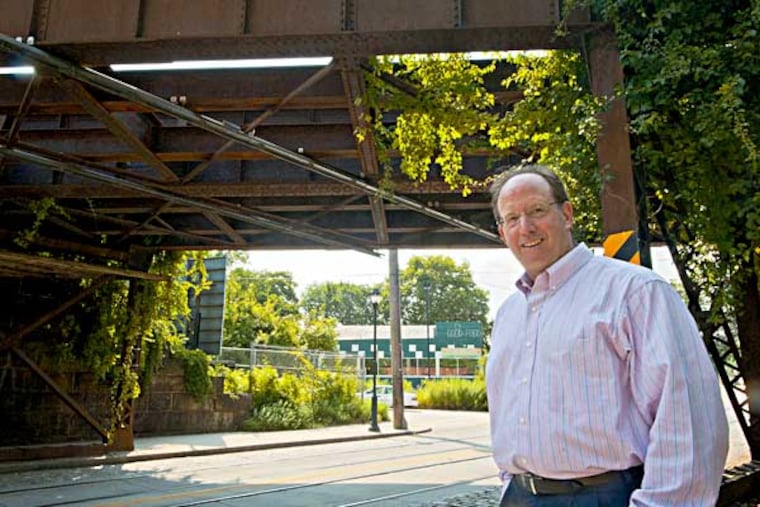Mount Airy trestle stalls trail plan
Outside the Trolley Car Diner & Deli in Mount Airy, members of Local 98 of the International Brotherhood of Electrical Workers set up "Do Not Eat Here" signs each weekday in protest of owner and developer Ken Weinstein's unwillingness to use union electrical contractors on some projects.

Outside the Trolley Car Diner & Deli in Mount Airy, members of Local 98 of the International Brotherhood of Electrical Workers set up "Do Not Eat Here" signs each weekday in protest of owner and developer Ken Weinstein's unwillingness to use union electrical contractors on some projects.
Weinstein estimates business is down 15 percent because of the pickets. But just beyond the diner's driveway looms what he considers a promising source of new revenue - and also a point of protracted contention:
An abandoned Pennsylvania Railroad trestle, straddling Germantown Avenue where Chestnut Hill and Mount Airy meet. Its tracks inactive to passenger traffic since the mid-1950s and long gone, the rusted bridge is partly overgrown with vines, its wood deck deteriorating. As a gateway to two thriving business districts, it's not inviting.
For at least the last eight years, community-development groups and recreation enthusiasts have pushed for its reuse as part of a proposed Cresheim Trail, a multiuse recreational path of about nine miles that would run from the Wissahickon section of Fairmount Park to Fort Washington State Park in Montgomery County, largely through Peco Energy Co. right-of-way.
Trail users would come right past the Trolley Car Diner, which Weinstein says he is confident would be an irresistible lure, much as his four-year-old Trolley Car Café has been to bikers, runners, and others using the Schuylkill River Trail along Kelly Drive in East Falls.
"It's clearly going to bring us customers," Weinstein said last week from a booth in the diner with a view of the trestle.
He said he resurrected two years ago an effort previously led by Mount Airy USA, a community-development agency, to get the city to accept ownership of the trestle from Peco, which says it no longer has any business use for it and has been willing to part with.
"Unfortunately, that effort broke down," Weinstein said last week, news Peco spokeswoman Cathy Engel Menendez confirmed.
"We were going to actually sell the trestle to the city for $1," she said. "About two to three weeks ago, that agreement dissolved. Our understanding is the city attorney advised the city against purchasing the trestle."
Engel Menendez denied rumors that Peco intends to take down the trestle - a move trail proponents oppose because it would provide trail users nothing but an at-grade crossing at Germantown Avenue, where cars often speed and, they say, a blind curve would make crossing on foot or bicycle that much more dangerous.
"We do not have plans at this point to take the trestle down," Engel Menendez said. "We certainly are willing to participate in an ongoing discussion with the community and work with the community to see what they want to have happen."
On Friday, Michael DiBerardinis, Philadelphia's deputy mayor for environmental and community resources, said the city was still open to discussion.
"I think at the end of the process, we are open to taking that into our inventory," DiBerardinis said of the trestle. But first, the city needs to assess whether "there are safety concerns or things that we would have to remediate that could cost a lot of money to make it safe and make sure it hits all the standards for a trail."
DiBerardinis said he had a "willingness to go through that process."
To that end, he was trying to reach Weinstein, who, DiBerardinis said, "has indicated a willingness to pay for some sort of look at that."
At the diner last week, Weinstein said he was willing to fund a $5,000 study that would determine whether the trestle contains any environmental hazards, most notably PCBs or lead paint.
"At this point, we'll do anything that's necessary to make it happen," he said of the trestle's incorporation into the trail.
There's a track record of positive economic impact from trails to justify it, Weinstein said: His plans for a $200,000, 50-seat addition to his 100-seat Trolley Car Café next winter is the result of the popularity of the Schuylkill River Trail across Kelly Drive.
With construction of the Cresheim Trail, "that energy can be brought to Mount Airy and beyond," Weinstein said.
At Friends of the Cresheim Trail, which Susan Dannenberg formed as a nonprofit in 2011 to pursue grants to help with the trail's development, she said that without the right-of-way to use the trestle, "the grantors can't help us."
At Mount Airy USA, beautifying the bridge was part of a two-year planning effort on a $4 million streetscape-improvement project for Germantown Avenue that has brought 80 facade upgrades, lights, trees, seating, and sidewalks.
"Now, the trestle sticks out like a sore thumb," said executive director Anuj Gupta, while a mural design for it is "sitting on the shelf."
215-854-2466 @dmastrull
To see a May 2008 feasibility study on the Cresheim Trail: http://d2la6m6gp07x7a.cloudfront.net/Cresheim_Trail_Final_Report.pdf